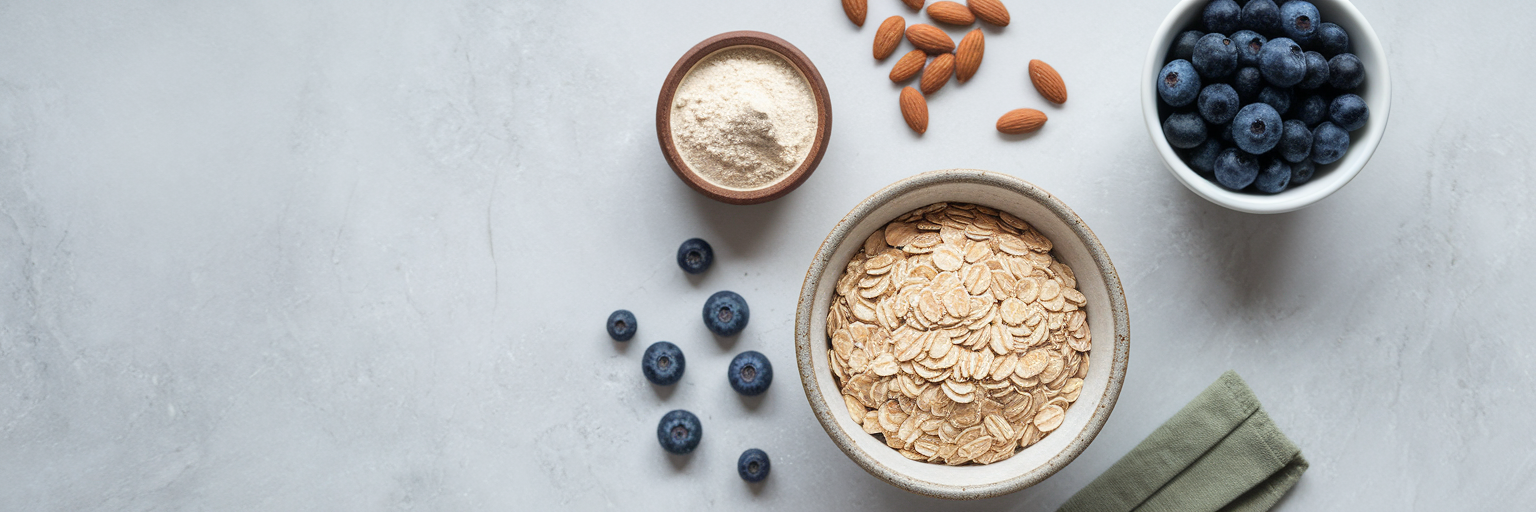The Constant Craving and the Protein Solution
We’ve all been there. It’s 3 p.m., your energy has hit a wall, and the pantry starts calling your name. That sudden urge for a sugary snack or a bag of chips isn’t a sign of weak willpower. It’s a biological signal that your body needs fuel, and it’s looking for the quickest source it can find.
But what if you could give your body a better kind of fuel? One that provides steady energy instead of a temporary spike followed by another crash. This is where protein comes in. Of the three macronutrients—protein, fats, and carbs—protein is the most satiating. This means it helps you feel fuller for longer, making it a powerful tool for anyone wondering how to reduce food cravings.
Not all calories are created equal when it comes to managing hunger. A 200-calorie snack bar high in sugar might leave you hungry an hour later, while a 200-calorie protein shake can keep you satisfied until your next meal. Vegan protein powder is an incredibly convenient way to increase your protein intake, whether you're an athlete or simply someone looking to stabilize your energy and feel more in control of your appetite throughout the day.
The Science Behind Feeling Satisfied

So, why does protein have this remarkable ability to keep hunger at bay? It all comes down to hormones. Think of your appetite as being controlled by a set of traffic lights. The "green light" for eating is a hormone called ghrelin. When your stomach is empty, ghrelin levels rise, telling your brain it’s time to eat.
On the other hand, the "red light" hormones, like Peptide YY (PYY), are released after you eat, signaling to your brain that you're full. Protein is brilliant at managing this system. It effectively turns down the volume on the green light (ghrelin) and cranks up the red light (PYY), sending clear messages of fullness that last for hours. This hormonal shift is a key reason why higher protein diets are so effective for appetite control. In fact, research from the journal Nutrients confirms that increasing protein intake leads to greater satiety, which can help you naturally consume fewer calories without feeling deprived. Understanding what makes a quality protein powder is a great first step, and you can learn more in our guide to the best protein powders.
Here’s a quick summary of how it works:
- Protein reduces levels of the hunger hormone ghrelin.
- Protein increases levels of fullness hormones like PYY.
- This hormonal shift leads to feeling fuller for longer.
- Over time, this can result in consuming fewer calories without feeling deprived.
Plant-Based Protein's Edge in Appetite Control
When people discuss protein, the pea protein vs whey protein conversation often comes up. While both can support your goals, plant-based proteins offer a unique advantage for appetite control: fiber. Many plant protein sources, like pea, brown rice, and hemp, naturally contain fiber. This powerful nutrient works in tandem with protein to slow down digestion and enhance feelings of fullness even further.
Pea protein, in particular, is a standout. A study highlighted in the journal Appetite found that it has a high satiety index, meaning it’s especially good at making you feel satisfied. Beyond just fiber, plant-based proteins also contribute to overall wellness by being naturally lower in saturated fat and free of cholesterol. This makes them a heart-healthy choice for long-term vitality.
Choosing the right one depends on your goals, and this table can help guide you.
Comparing Popular Plant-Based Proteins
| Protein Source | Key Benefit for Satiety | Amino Acid Profile | Best For |
|---|---|---|---|
| Pea Protein | High satiety index, digests slowly | Rich in BCAAs, but low in methionine | Smoothies, baking, post-workout recovery |
| Brown Rice Protein | Hypoallergenic and easy to digest | Complements pea protein well (high in methionine) | Mixing into oatmeal or creating protein blends |
| Hemp Protein | Good source of fiber and healthy fats | Complete protein, but lower in lysine | Adding a nutty flavor and extra fiber to shakes |
| Soy Protein | Contains all essential amino acids | Complete protein profile similar to animal sources | Versatile use in both sweet and savory dishes |
Note: This table highlights the unique characteristics of common vegan proteins. Blends of pea and rice protein are often used to create a complete amino acid profile, maximizing nutritional benefits.
Easy Ways to Boost Your Meals with Vegan Protein

Incorporating vegan protein powder into your diet is simpler than you might think. It’s not just for post-workout shakes. Here are a few friendly, practical ways to add a scoop of satiety to your daily meals and stabilize your blood sugar.
Start Your Day Strong with a Protein Smoothie
A morning smoothie is one of the easiest ways to set yourself up for a successful day. Blending a scoop of protein powder with fruit, leafy greens, and a healthy fat like avocado or almond butter provides a balanced meal that delivers sustained energy. This combination prevents the mid-morning crash and keeps you full until lunch. There are countless easy protein smoothie recipes out there to get you started.
Upgrade Your Breakfast Bowl
If you prefer a warm breakfast, simply stir a scoop of vanilla or unflavored protein powder into your oatmeal or plant-based yogurt. It adds a creamy texture and a powerful protein boost that turns a simple carb-heavy breakfast into a balanced, satisfying meal. Top with berries and nuts for extra fiber and healthy fats.
Sneak Protein into Savory Meals
Who says protein powder is only for sweet dishes? An unflavored vegan protein powder can be a secret weapon in the kitchen. Try adding a scoop to thicken soups, stews, or pasta sauces. It dissolves easily and adds a protein punch without altering the taste. This is a fantastic way to make your favorite comfort foods more filling and nutritious. For more inspiration, check out these 3 easy vegan protein recipes you’ll actually crave.
Supporting Long-Term Weight and Wellness Goals
While managing daily hunger is a great benefit, consistent protein intake plays a crucial role in long-term health. Using vegan protein for weight loss isn't about a quick fix; it's about building a sustainable foundation for a healthy body composition. When you're in a calorie deficit, getting enough protein is vital for preserving lean muscle mass.
Why does this matter? Muscle tissue is metabolically active, meaning it burns more calories at rest than fat tissue does. By maintaining your muscle, you help support a healthy metabolism, making it easier to manage your weight over time. Beyond weight management, there are many other plant based protein benefits for metabolic health. These include supporting balanced blood sugar levels and contributing to overall wellness. Building these habits is a journey, and you can explore our full range of products to support your goals.
Finding Your Perfect Plant-Based Protein
With so many options, how do you choose the right one? Look for a "complete protein," which means it contains all nine essential amino acids your body needs. Many of the best vegan powders use a blend of proteins, like pea and brown rice, to achieve this complete profile.
Here’s a quick checklist for reading labels:
- Complete Amino Acid Profile: Check for a blend of sources.
- Minimal Added Sugars: Choose powders sweetened naturally or not at all.
- Clean Ingredients: Avoid artificial flavors, colors, and fillers.
Ultimately, the best choice is one that you enjoy and that fits your lifestyle. Ready to feel fuller and more energized? Explore our clean, delicious Chocolate Vegan Protein.
If you found these tips helpful, please share this article with a friend on their own wellness journey!



